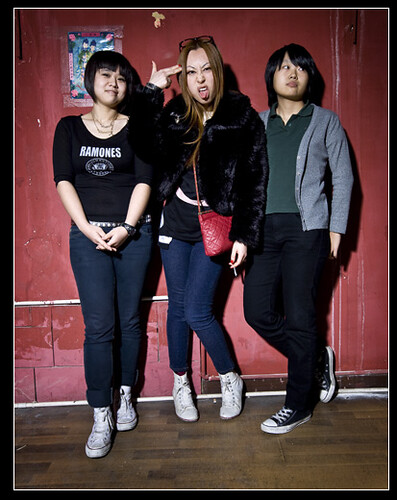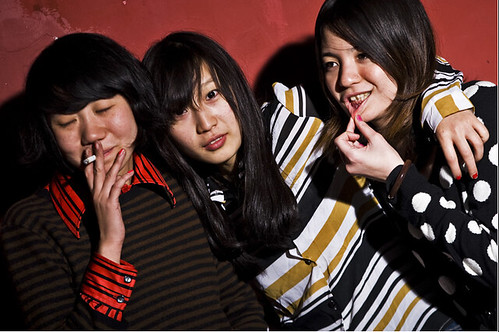Maybe Mars are going to New York for a big old party. Central to this party will be a photographic exhibition by Matthew Niederhauser, a photographer who has documented Maybe Mars and D-22 through images of the bands that have created this label/ venue community up in Beijing’s Northern reaches. He is launching his second book, Sound Kapital, at the same time.
You can read the first part of the interview HERE.
You can find out more about Matthew at his website HERE.
You can find out more about the Maybe Mars US tour HERE.
[AH]: It seems like you’ve travelled in China a bit.
[MN]: I went on tour with Demerit for two months last summer. That was an awesome trip. They put on an amazing live set, they’re great. I travelled with them for 2 months, did a big photo project on the road. Playing some smaller cities during the week between bigger cities on the weekends, you come in and 10 people might show up to these shitty bars. We had 8 kids in Ningbo, and they had their heads blown off. 20 people showed up in Yiwu, and they put on one of the bests sets of the tour.
[AH]: I agree completely on Demerit. We (Split Works) had 600 people at the Maybe Mars showcase at last year’s JUE Festival, and 60 people to the Demerit show the night before – a venue which holds 600. It was the Friday before Chinese New Year, and it was a bad night in terms of weather. Demerit was so disappointed, but they put on what was later said to be one of Shanghai’s best live performances. That’s what I like to see coming out of Beijing – a band that loves to play and loves to play for their fans.
[AH]: What’s your favorite band?
[MN]: Off the top of my head, Demerit of course. Snapline, I think they’re incredible and their new CD is going to be amazing (we will have more on that later this week). Carsick Cars, Subs, PK14.
[AH]: Anything outside Beijing?
[MN]: AV Okubo, Banana Monkey when they were will around, Boys Climbing Ropes.
[AH]: What does the future hold for you? Are you optimistic?
[MN]: I’m optimistic. Sometimes I feel that Beijing is stalling a bit, but what keeps me optimistic are the inroads to the interior. Like Chengdu, Guangzhou, Xian, Wuhan. The hope is that they’re going to take off strongly and challenge Beijing, which has to happen.
[AH]: You have an East Asian Language degree – I’m really interested in the sociological aspect of where we are and what we’re doing. Are the Chinese ever going to get what this is, or will it remain a blip on the collective consciousness?
[MN]: I don’t think it’s going to be a blip, I feel what’s going on right now is going to be a part of a much larger discourse in the future twenty years down the line. There has been a creative explosion within the Chinese music scene, they said it was in Beijing, musicians went to Beijing, and it spread from there. The thing driving all this is the change that occurred in communications in China – the internet–savvy generation in China with more eclectic interests. Cell phones, Douban accounts.
[AH]: The communities are definitely joining together – but these bands have been around for 10 years and they’re still playing for small audiences.
[MN]: It’s still very nascent and it has a long way to go, but it’s bigger than what it was before. The potential for exponential growth is huge in China. You want all of these large municipalities around China to be tapped, and the most important thing that has occurred is that we can provide venues for these bands to perform, and they in turn begin to take themselves seriously. People will start practicing, taking themselves seriously as musicians. I foresee alternative music venues popping up across the interior. I hope that there will be a challenge to Beijing’s supremacy.
[AH]: But from your studies, do you think the Chinese can see value in discourse, and the potential harshness of change – stuff outside mainstream pop music.
[MN]: Canto Pop is a fucking huge challenge. But at the same time, I think China’s experiencing an absurd amount of competition across every social stratum. People are taking a stand against conformity and trying to be individuals. As cultures coalesce, there’s going to be an undercurrent of counterculture. Whether or not there’s going to be a change like the early 90s when Seattle went mainstream, who knows? It’s hard to make a generalization because China’s so fucking huge.
[AH]: Yeah, what happens in Chengdu may not work in Beijing.
[MN]: The market in Chongqing may be bigger than the entire US east coast market. It’s going to continue, but to where is hard to say. There needs to be more venues in the cities of China’s interior.
[AH]: And people who know about this stuff.
[MN]: and bands from bigger cities going out and setting examples. Lastly, the biggest detriment to the scene so far has come from large cash infusions, corporate advertising.
[AH]: To finish up, let’s talk about your book. You’re launching it in New York, and London. What are you hoping for?
[MN]: London and New York in the same week. And then I’m going to do an event in Beijing eventually too. The Book will include a CD compilation of 19 tracks – pretty much everybody in Beijing will be on it. AV Okubo, Snapline, Subs, Demerit, New Pants, Lonely China Day. The book is a social document – it’s not about “these guys are taking over the world!” It’s about a particular place and time in a certain stage of China’s musical evolution. It’s not about the future, because I don’t know where that’s going to go. It has been an amazing two years for me. I love going in and taking photos of these bands at college night, telling them to put it on their myspace, and they’re just psyched to have these photos.
[AH]: We go to these 2nd and 3rd tier cities, and we put on shows with bands warming up who have never seen the kind of production we roll in. That’s the kind of freshness I see only in Shanghai and Beijing – the core really hasn’t spilled out that much. There needs to be a new crop of bands that challenge the old guard.
[MN]: That’s hard to imagine as coming from within Beijing itself. The younger kids look up to these bands so much, so maybe they won’t try to topple them, but it would be good to generate a type of Beijing-Shanghai rivalry.
——————————–
Thanks to Matthew for his time. You can read more at the Economist HERE.



